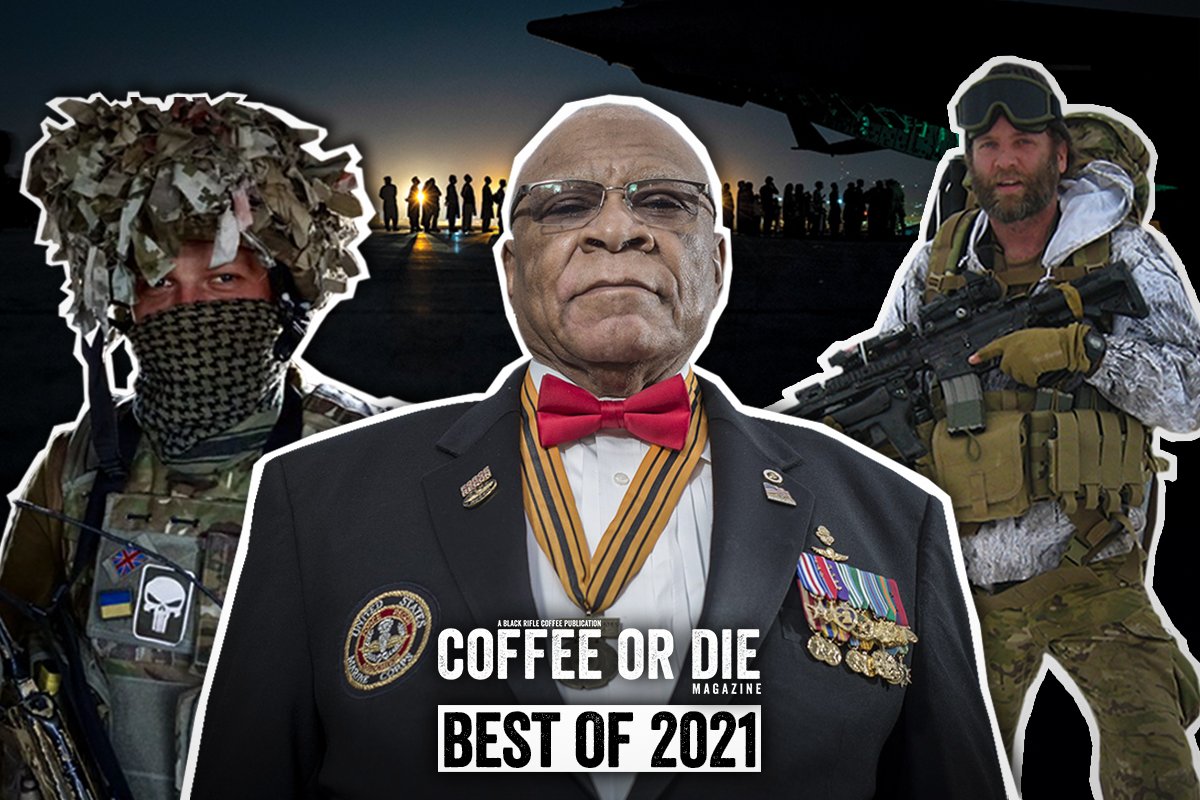
From veteran profiles to leaving Afghanistan to the crisis in Ukraine, Coffee or Die Magazine has had plenty of big stories in 2021. Composite by Coffee or Die Magazine.
It was a heavy-hitting year for Coffee or Die Magazine as we continued to grow and change along with the rest of the world in 2021. We had reporters on the ground as the United States pulled its last remaining troops out of Afghanistan. Veterans have shared their stories with us as they look back at the war, which is now a chapter in history for most Americans. We had the honor of speaking with incredible individuals, like the former Nirvana rocker who became a Special Forces veteran, or the FDNY firefighter who was buried alive twice on 9/11.
Our own Nolan Peterson is currently reporting from the conflict areas in Ukraine, where a potential invasion lies on the horizon as tensions with Russia have been dramatically increasing.
We also launched our quarterly print magazine and supercharged our YouTube channel with new videos that resonate with our audience, including simple rundowns of military units and history and INTSUMs (intel summaries) for breaking stories all around the world.
It’s never an easy task to narrow down our favorite stories and videos from the year, but these 15 stories and five videos — in no particular order — are a solid representation of who we are, what we’re passionate about, and, most importantly, what matters to you, the readers.
Starting tonight, you can cast your vote for which of these stories you think is best over in our Instagram stories.
The Best Coffee or Die Stories of 2021
“How Nirvana Rocker-Turned-Special Forces Veteran Jason Everman Rediscovered the Music” by Hannah Ray Lambert
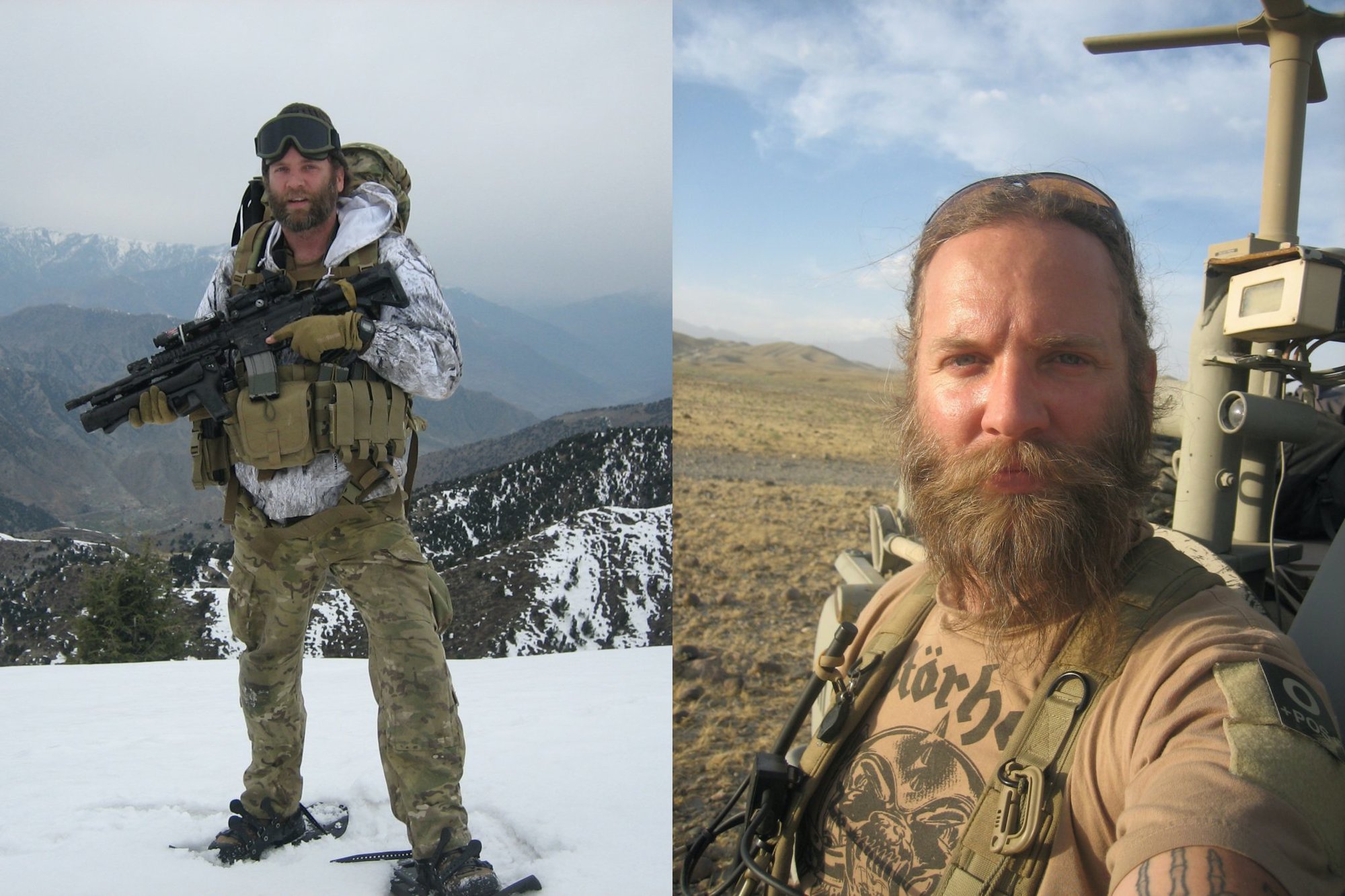
“After having spent so long in the Army during peacetime, seeing fighting up close moved combat from an abstract concept to something real. Tangible. Bloody. Life-altering.
“‘It was probably the most profound experience of my life,’ he says.
“’Without sounding too pretentious, kind of like, understanding the human condition,’ he continues. ‘It takes an event as extreme as war that simultaneously brings out both the worst and the best in people, which seems like a logical contradiction. You’re literally willing to kill someone, actively killing people, but at the same time that’s when someone jumps on a grenade to save their friends. So it’s on the one hand merciless and on the other hand kind of just like selfless love.’
“Finally, Everman found what he had been searching for.”
“The Legend Of Jim Capers: The Hero Who Never Was” by Ethan E. Rocke
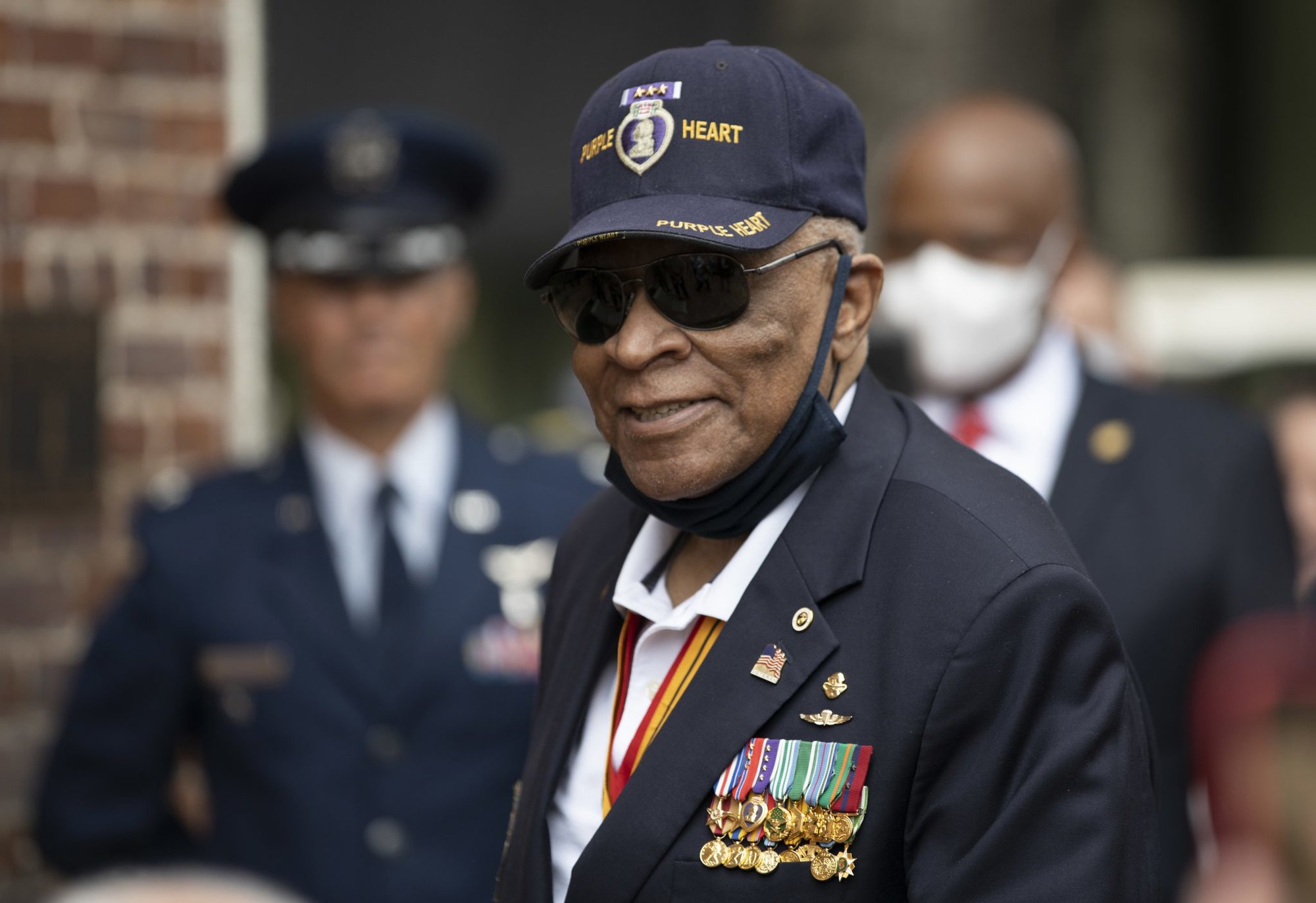
“As the commandos moved swiftly through the bush, Capers dropped back to booby-trap the path behind them with grenades. The enemy was everywhere, but for hours, the team evaded them. Sgt. Ron Yerman, the radio operator, called for extraction, and they made their way up a steep, rutted slope to higher ground. The topography was less than ideal, forcing the CH-46 to hover above the thick jungle canopy while it lowered a harness to hoist the men one by one. Bullets began whipping in from all directions. Above, the helicopter’s .50-caliber machine guns roared to life, hammering the wilderness around them.
“As the commandos were hoisted into the chopper, Capers darted from tree to rock to tree again, squeezing off a few rounds at each point to give the illusion that there were multiple soldiers still on the ground.”
“Dispatch: Inside Kabul Airport — ‘A Death Metal Show With One Exit. And The Place Is On Fire’” by Jariko Denman
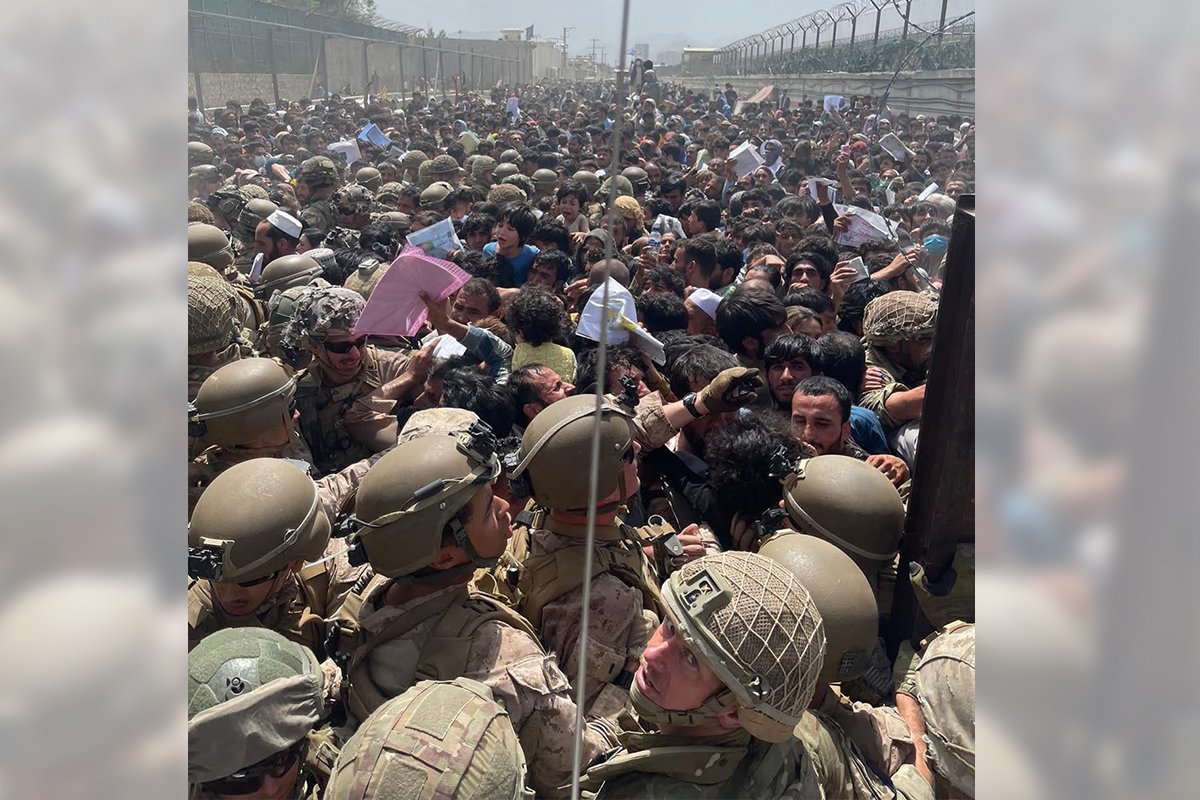
“What’s it like to get somebody past the gates at Hamid Karzai International Airport? A lot of media and people seem to think it’s like signing in your girlfriend when you lived in the barracks.
“It’s not that simple.
“It’s more like trying to pick up someone who doesn’t speak your language and looks exactly like everyone else there. “There” being a fucking death metal concert at Madison Square Garden.
“And it’s at triple capacity.
“And only one door is open.
“And the place is on fire.
“I’m not a religious person, but the word that comes to mind is ‘biblical.’ It’s like Hurricane Katrina meets Dien Bien Phu.”
“Exclusive: Embedded With the Last Afghan Special Forces Team in Mazar-i-Sharif” by Hollie McKay
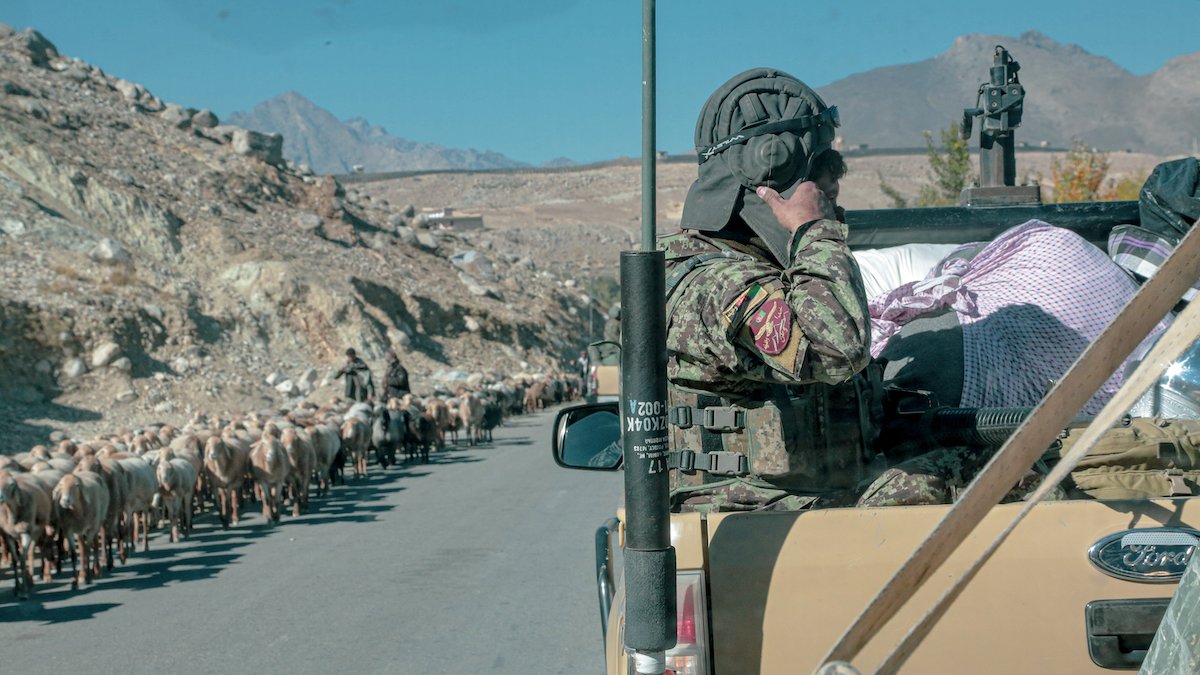
“As the Taliban swept toward this northern city last week, I sat with 27-year-old Safidullah Mohammadi, an Afghan special forces commander, outside his military compound on the fringes of the city in the haunting quiet.
“Not far away, his forces were supposed to be pushing the Taliban back — only there was no sound. Just an uncomfortable gnawing sensation in the pit of my stomach as it dawned on us both that something was very, very wrong.
“’We will not stop fighting. We will fight until the end,’ he told me with wide and weary eyes. ‘My men have promised me that they will fight. We have to fight — we don’t have another choice.’
“But they didn’t fight. Or at least, they never got a chance to.
“The commandos were Afghanistan’s most trained and treasured troops, the core of the Afghan Special Security Forces, and they numbered around 4,000. The qualification course to become a commando takes a grueling 14 weeks, with each hand-picked soldier assigned to one of 10 teams around the country.”
“What Did We Leave Behind When We Left Afghanistan?” by Nolan Peterson
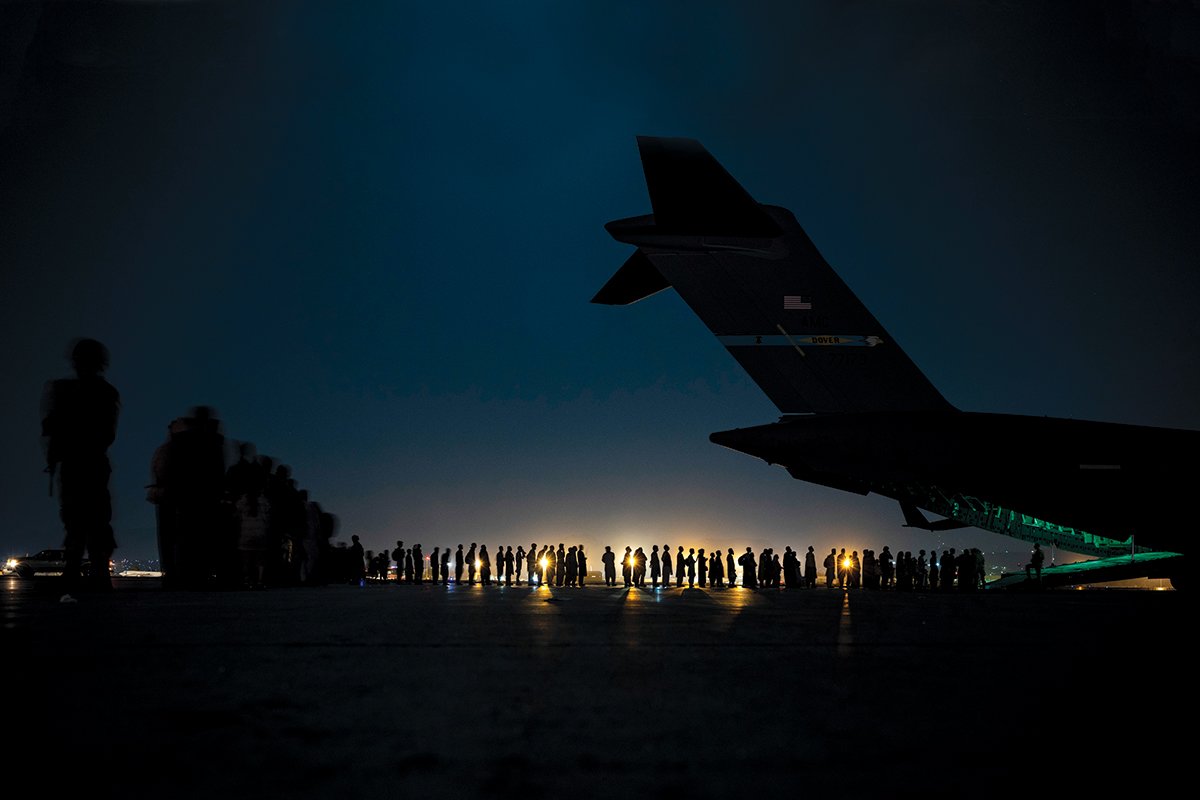
“After a certain point, we didn’t know what victory was supposed to look like. But we knew one thing for sure: Outright defeat was never going to happen so long as Americans were there. Until that horrific attack on Aug. 26, 2021, that killed 13 Americans, we hadn’t lost a soldier in combat in a year and a half. And during the war’s waning years, only a shadow of the 100,000 of us who had once been in Afghanistan remained. Would a stalwart force of a few thousand American troops have been enough to avoid the disaster that struck Kabul on Aug. 15, the day the Taliban took over? We’ll never know.
“Now we’re all home and our war is over, so what’s the thing to do? Do we mourn, get mad, or just quietly move on? It’s probably too soon to say. Best we can do for now is simply take a moment and remember what we left behind. We must remember, because when the towers fell, “never forget” became the mantra for which we marched to war.”
“With New Recon Sniper Course, Marines Seek To Make More Elite Snipers” by Ethan E. Rocke
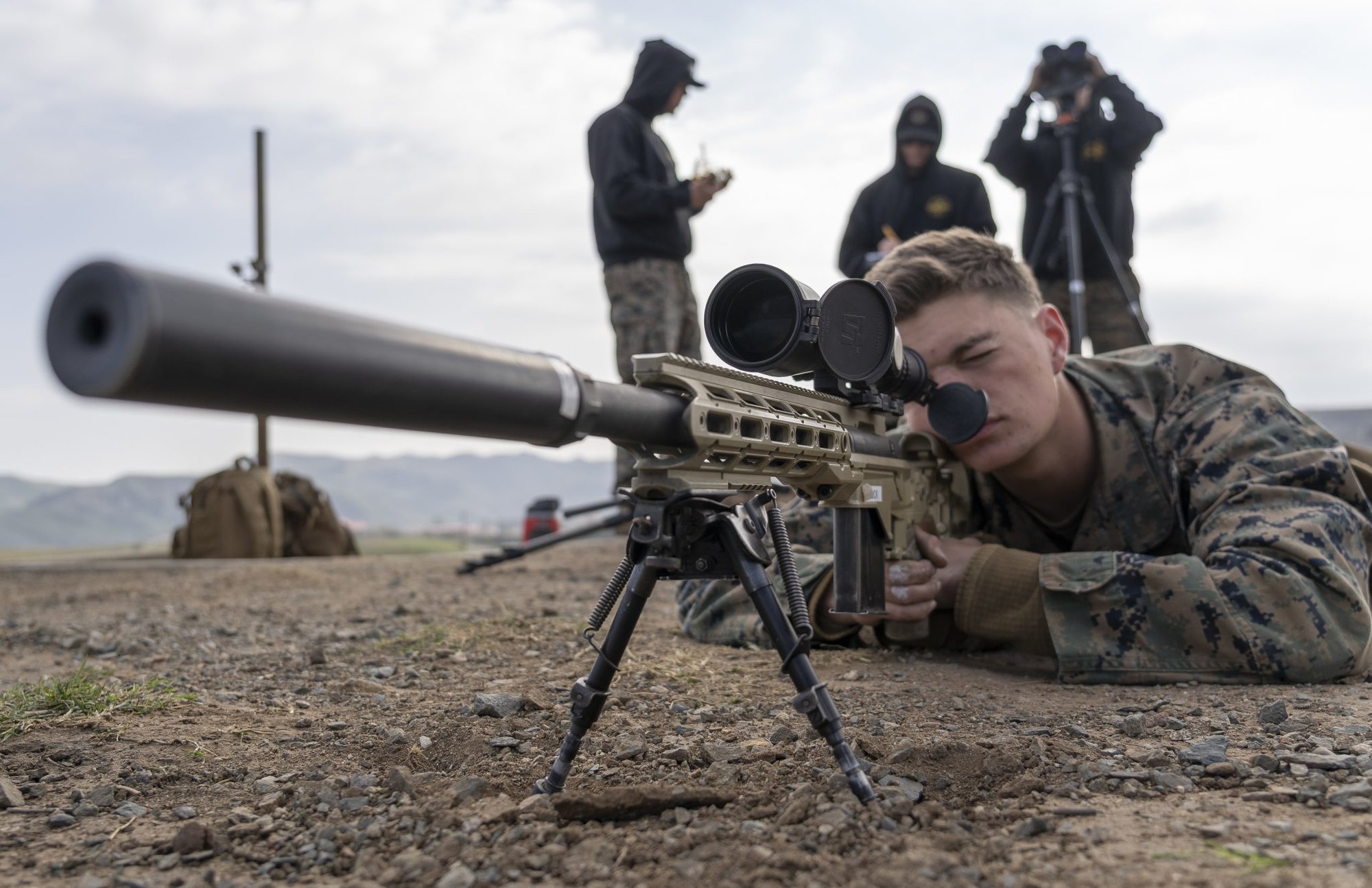
“Under an overcast sky on an urban warfare range aboard Marine Corps Base Camp Pendleton, a shooter waits for an instructor’s signal.
“’Let’s go!’ the instructor shouts, sprinting toward a nearby building and quickly up a flight of stairs. Kitted in full body armor, helmet, and assault pack, the shooter strains to keep up, his heart rate climbing with every step. Then, in an unexpected twist, the instructor leads the student down more stairs and out the other side of the building, across another 75 yards and up to the second-floor window of another building.
“Breathing heavily, the shooter takes a knee and hastily inserts a magazine in his M110 Semi-Automatic Sniper System, pulling back the charging handle to seat a round.
“’This is your support,’ the instructor says, pointing to the window frame. ‘Staggered column, left to right, 300 meters. Let’s go!’”
“Exclusive Front-Line Report: Modern Trench Warfare in Eastern Ukraine” by Nolan Peterson

“The Ukrainian soldier warns me to speak no louder than a whisper. The enemy lines are less than 50 meters away, he tells me, and my voice — if too loud — can easily carry across no man’s land and invite gunfire from the other side.
“’We see each other, and we shoot at each other every day,’ says the soldier, whose name is Mykhailo. ‘Everyone is afraid … we are afraid, and the Russians are afraid of us.’
“We’re standing at one end of a ruined factory on the outskirts of the city of Avdiivka in Ukraine’s eastern war zone. Ukrainian soldiers seized the building in a bloody 2017 battle that involved close-quarters combat. On this day in October, the war-ravaged structure clearly evidences its violent history. The factory floor is a wasteland of blasted concrete and twisted metal. The inanimate detritus of urban combat covers the ground — shattered glass, crumbled concrete, bullet casings, shrapnel shards. There’s graffiti on the walls, including the words, spray-painted in English: ‘God bless us.'”
“Academy Cadets Who Have Kids Must Legally Give Them Up — The CADET Act Would Change That” by Maggie BenZvi
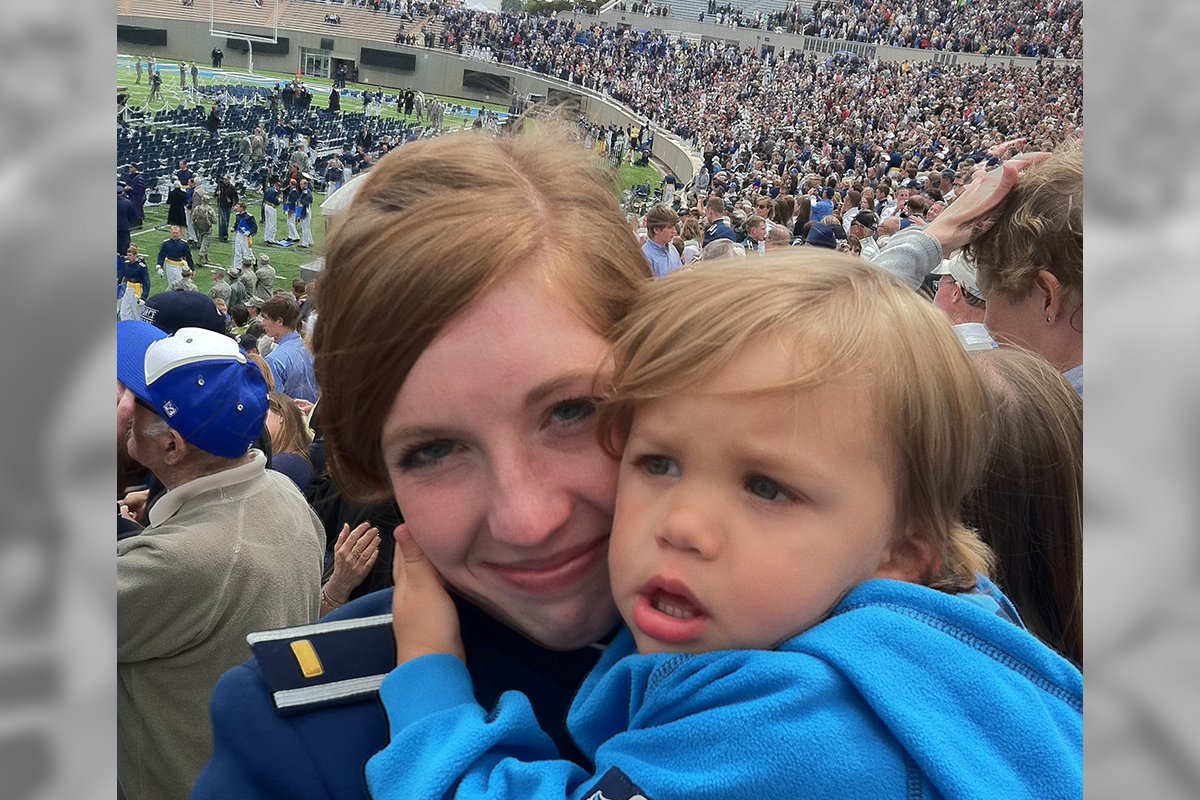
“The CADET Act would not, however, lead to day care centers popping up in academy dorms. Cadets would still not be allowed to have physical or legal custody of their children, nor would they be provided with any version of family housing, which is common elsewhere in the military, even in many training schools (cadets at all five academies are required to live in campus dorms for all four years of school).
“The key change would be to allow cadets who become parents to temporarily name guardians for their children, such as their own parents or siblings, or grant full but temporary parental rights over to non-cadet parents. The intent is to bring the rights and responsibilities of cadet parents roughly in line with those that apply to many parents in the larger military — particularly single parents — for deployments and other periods apart, the CADET Act sponsors say.”
“‘God Left Me Alive To Do This’: FDNY Veteran Tim Brown Recalls the Heroism and Horror of 9/11” by Mac Caltrider
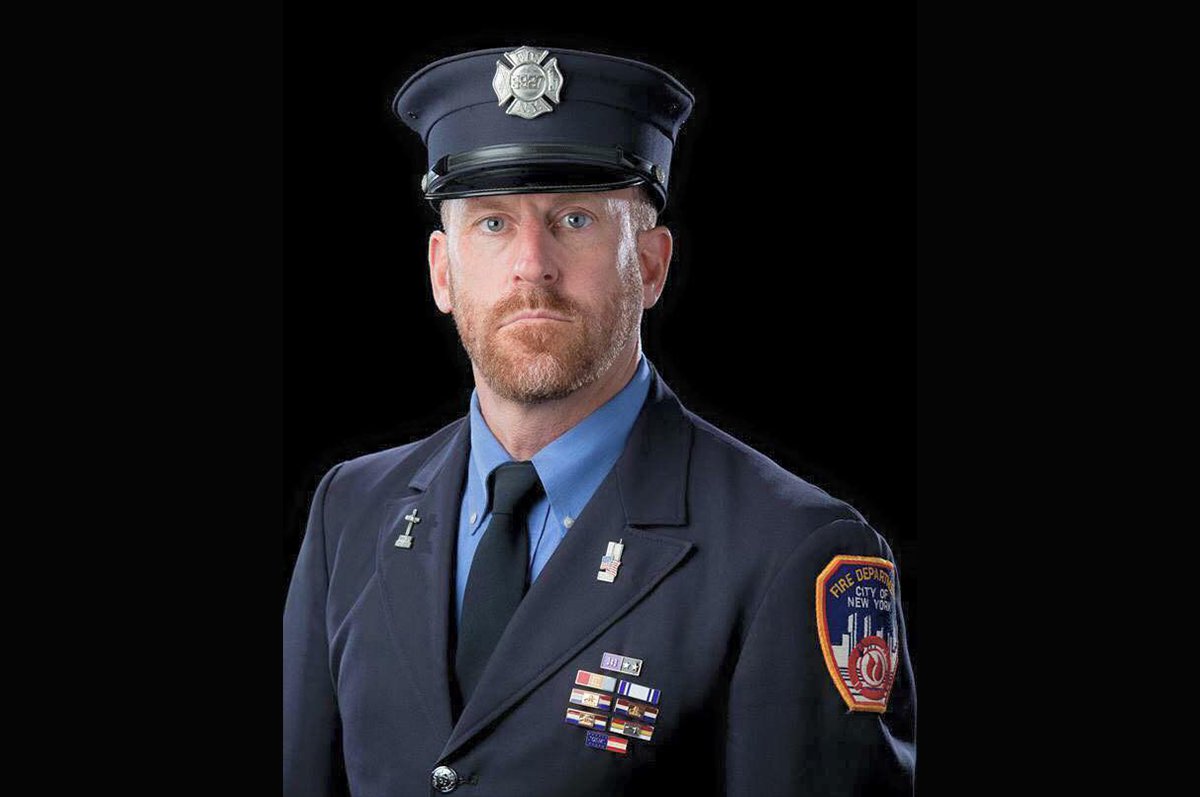
“’In the snap of a finger, everything went pitch black,’ Brown recalls.
“The collapse created a surge of smoke and debris that snuffed out all light and breathable air. Dust instantly filled Brown’s ears, nose, eyes, and mouth. His legs lifted off the ground, parallel to the floor from the 185 mph rush of air. The noise was so loud Brown could only compare it to sitting on a stool in the middle of the tarmac at JFK International Airport, surrounded by 747s with their engines at full-throttle. It took nine seconds for 110 floors of concrete, steel, and people to collapse around him.”
“How a Virginia Law Enforcement Officer Earned the Nickname ‘Deputy Hulk’” by Joshua Skovlund
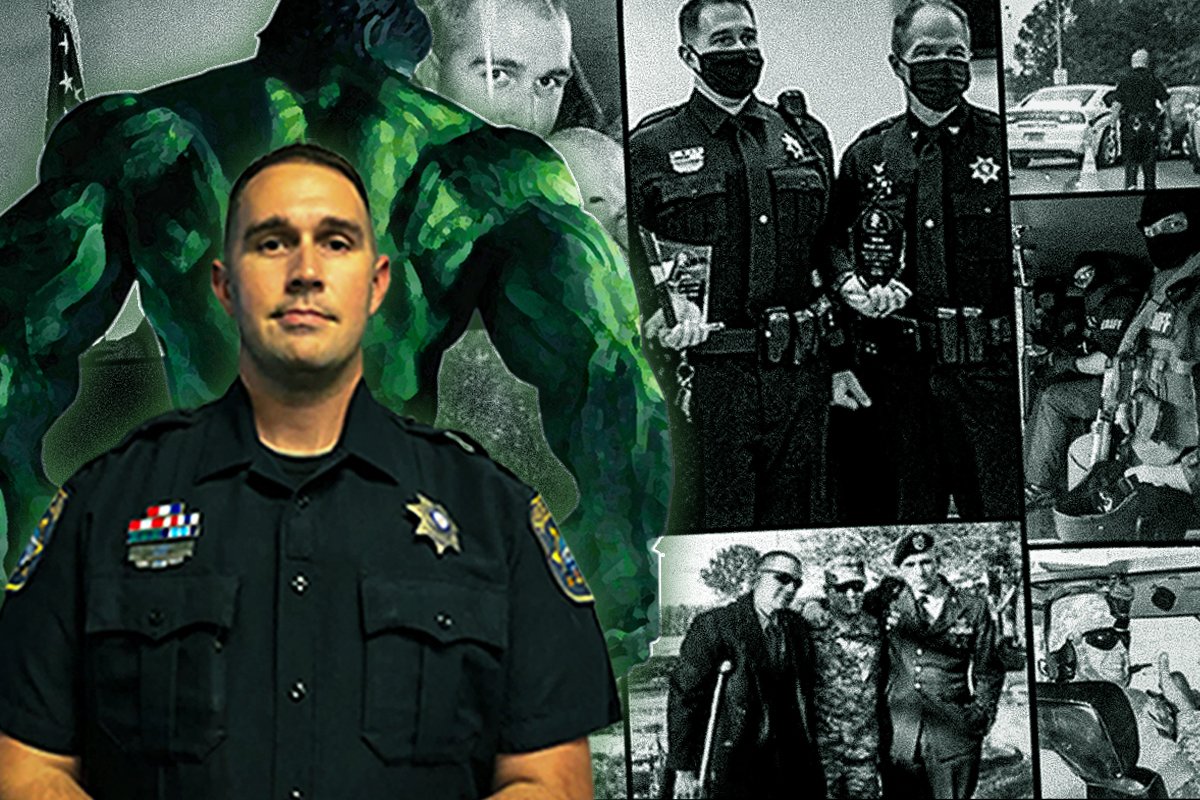
“’The first thing they say is ‘never say you can’t do anything because you just haven’t tried yet,’ Holt said.
“Holt put his right shoulder — the side of his body that had taken the worst of a roadside bomb in a Baghdad, Iraq, ambush years earlier — into the SUV’s door frame and lifted with everything he had. The footage from his body camera blacks out at this point, but the audio captures Holt groaning under the weight of the vehicle as he lifts it a few precious inches. The woman lets out a loud gasp of air as the weight comes off her.
“’Can you slide any, ma’am?’ Holt yells on the video, still holding the vehicle up.”
“Medal of Honor: Christopher Celiz ‘Filled Every Block as a Ranger’” by Matt White
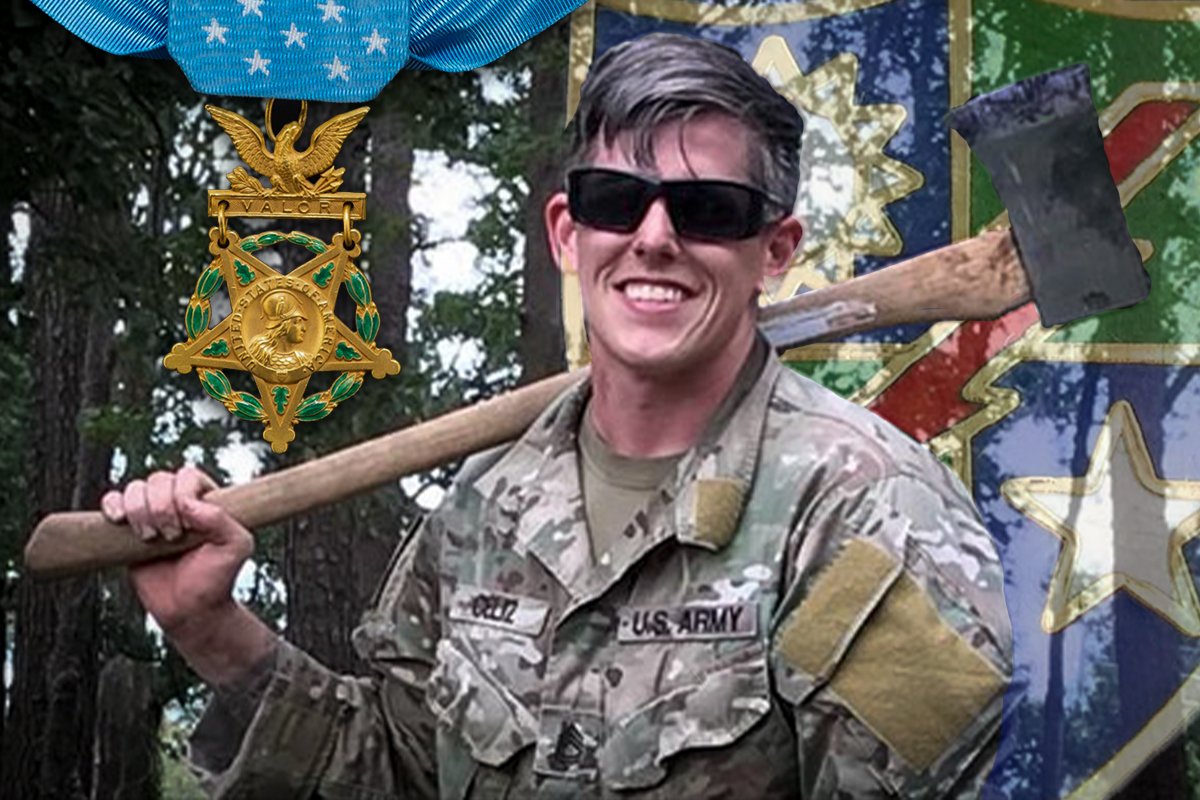
“On July 12, 2018, Celiz was leading a team of Rangers on an operation with their CIA and Afghan partners when the force was ambushed by a large force of insurgents. Celiz retrieved a heavy machine gun and laid down fire to give his team room to recover wounded, then covered the team loading the wounded into a helicopter. Knowing the helicopter was vulnerable on the landing zone, Celiz stood alone by the side and then at the nose of the aircraft, firing at enemy positions, drawing bullets away from the wounded and the pilots.
“As the helicopter lifted away, bullets hit Celiz and he dropped. Mortally wounded, he waved away the helicopter that might have returned to save him, but that held his wounded comrades.
“’He had the intestinal fortitude to turn to the bird and he completely put that man’s life in front of his own,’ said his fellow Ranger. ‘He wanted that man to survive and he completely forgot about his own.’”
“In Loving Memory: A Marine Killed in Kabul Recalled for How He Lived” by Joshua Skovlund
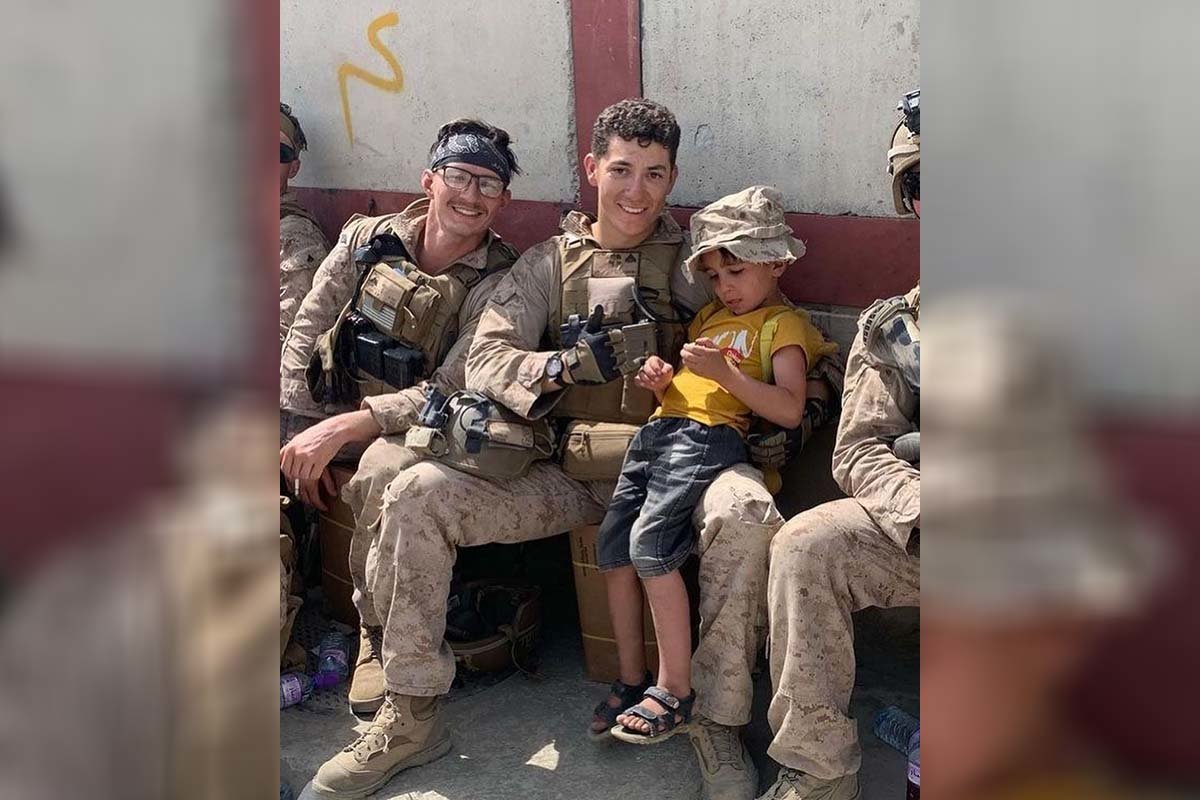
“In the wake of his death, Hunter’s fellow Marines contacted the Lopez family to share funny anecdotes and the sea stories infantrymen tell, but they all ended the same way: with an assurance that the son they sent off to war became an excellent Marine who was beloved by his troops.
“There was the Marine he taught to drive. Hunter helped prep him for his driver’s license test, and even loaned him his car to use for it. The Marine told the Lopez family that Hunter was forever humble and never told anyone about what he’d done, but he wanted them to know that if the corporal hadn’t helped him, he wouldn’t have a driver’s license.
“’I’m definitely proud of him for doing what he did in this short life. I wish every day that I still had him — I want to see him,’ Herman said. ‘I’m glad that he was part of this mission. I’m glad that he was able to help so many people. I’m obviously proud of him. I’ll always be proud of him.’”
“Idaho Rescue Teams Pull Couple From Truck Dangling Above Gorge” by Matt White
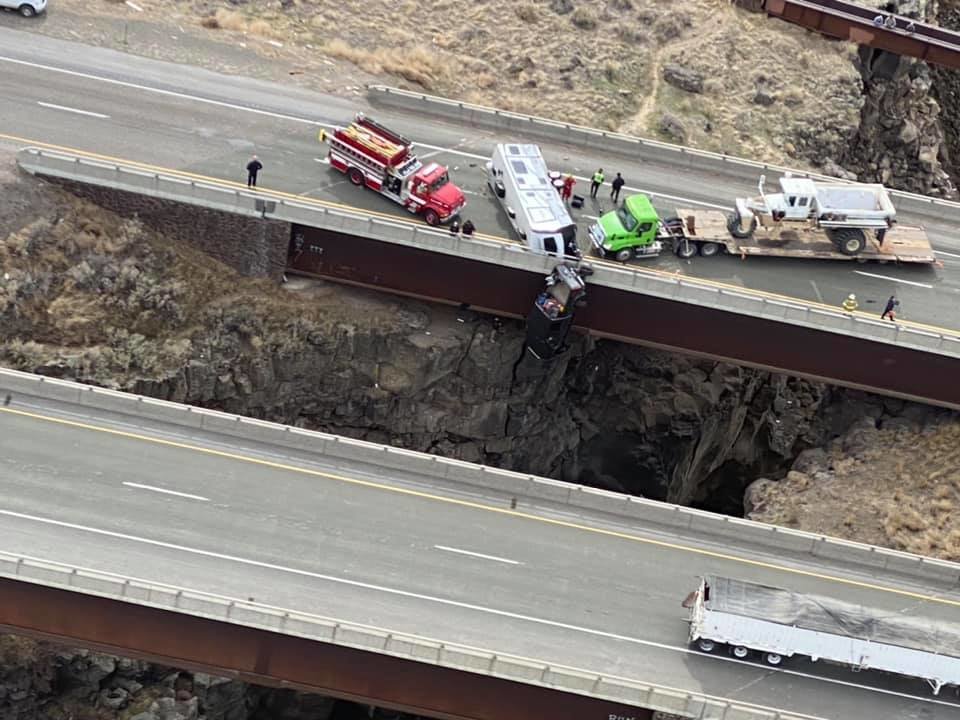
“Highly trained mountain rescue paramedics from around southern Idaho leaped into trucks, cars, and even a helicopter to retrieve a couple — and their two dogs — from the cab of a pickup truck dangling from a highway bridge over a mountain canyon Monday. The man and woman inside, both in their 60s, were pinned by their own seatbelts and helpless to escape as their truck hung from a single safety chain above a 100-foot plunge.
“After hitching a ride on a helicopter normally used for transporting critical patients, specially trained paramedics from the Twin Falls-based Magic Valley Special Operations and Rescue Team, or SORT, rappelled to the truck and brought both passengers and their dogs to safety.”
“Why Navy SEALs in Vietnam Wore Bluejeans Instead of Jungle Fatigues” by Matt Fratus
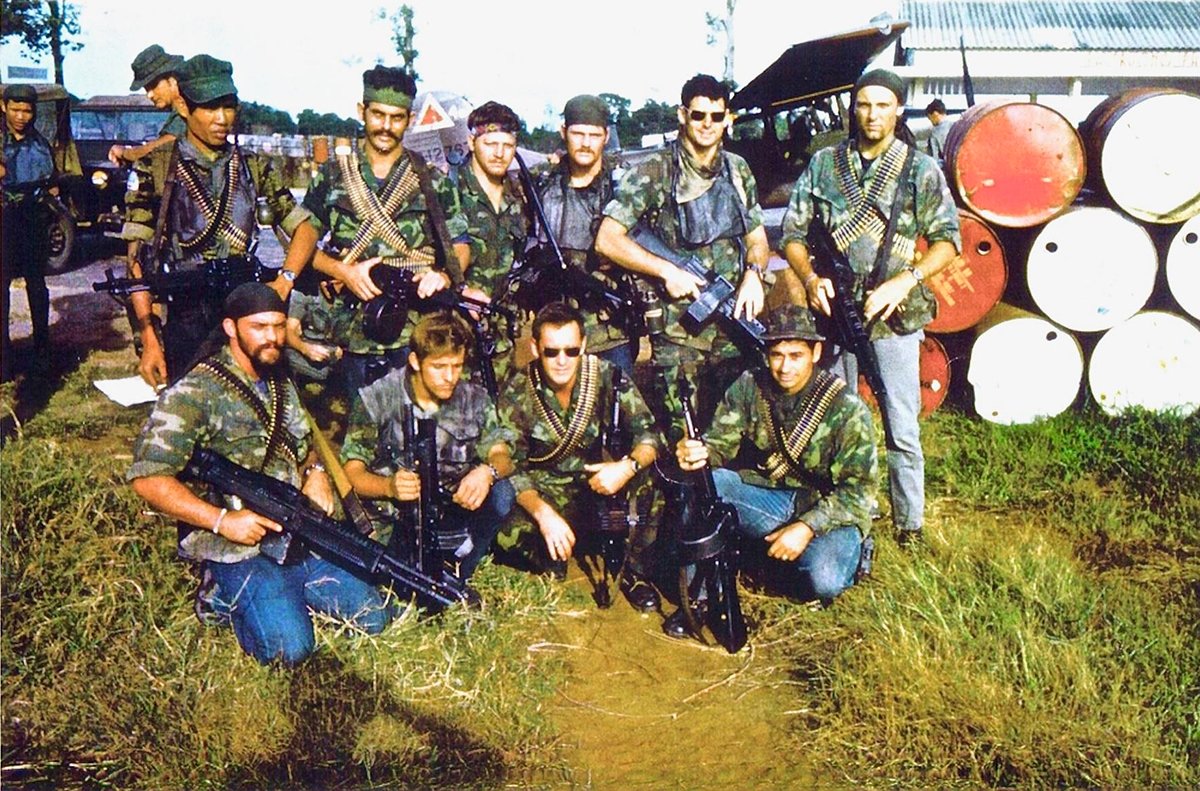
“The US Navy SEALs established their reputation as a fierce maritime commando force during the Vietnam War. These “men with green faces,” as they were known to their Viet Cong enemies, often wore green face paint and disguised themselves in black pajamas. On nighttime operations, however, the SEALs quickly learned that jungle critters were a serious problem. And they needed an unconventional solution.
“’One of the things about black pajamas, you had to dig the leeches out, because leeches would always tie to you,’ retired Navy SEAL Kirby Horrell, whose career spanned 47 years, told Coffee or Die Magazine. ‘That’s where we started having our girlfriends send us pantyhose. We could put pantyhose on and the leeches couldn’t bite through them.’
“Horrell — who carried the Stoner 63 weapons system as a point man for SEAL Team 1’s Foxtrot Platoon during a 1970 tour in Vietnam — soon discovered that bluejeans made a better combat-uniform alternative than the local Vietnamese garb.”
“Courage 53: The 10th Mountain Division’s Forgotten Rescue Mission In Mogadishu” by Dustin Jones
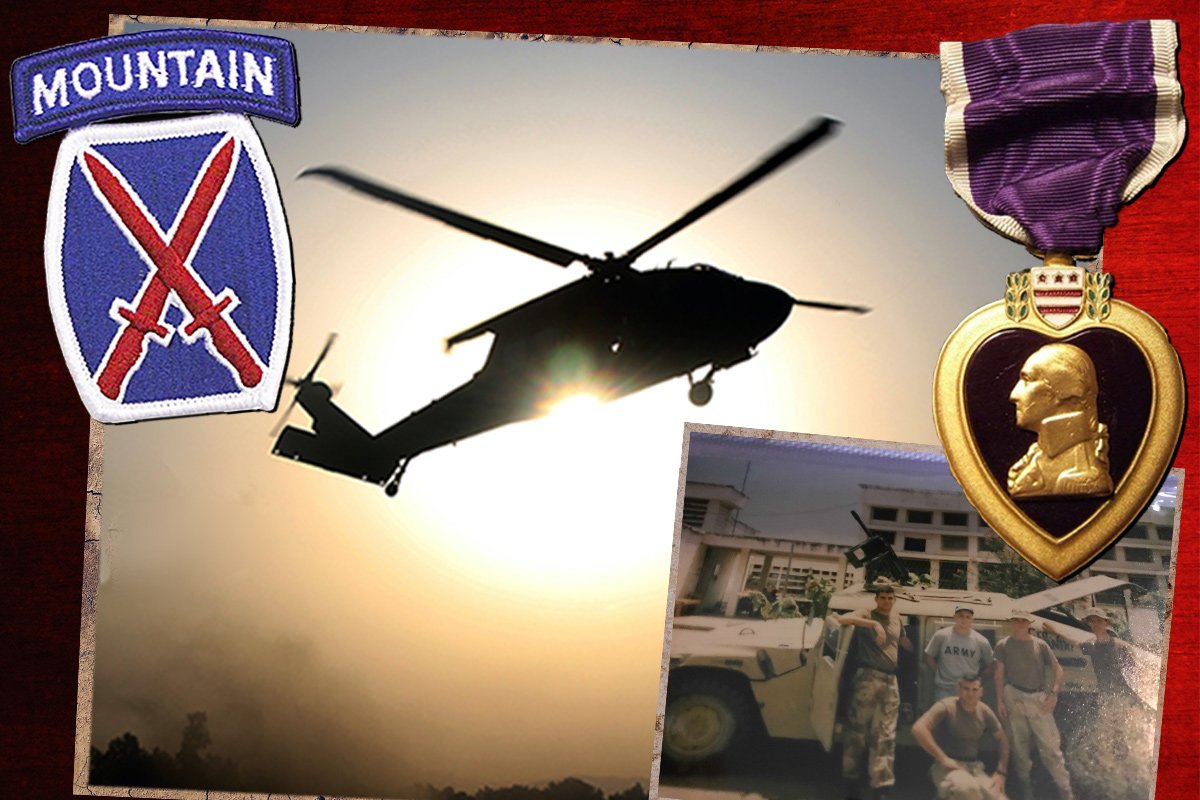
“A week after Archibald and his fellow soldiers rushed to Courage 53, the infamous and eerily similar Battle of Mogadishu occurred, immortalized in the book and movie Black Hawk Down. In that fight, many of the same 10th Mountain soldiers again convoyed into the city to find two more Black Hawks that were shot down, stranding their crews and dozens of Rangers and special operators.
“Archibald missed that fight.
“In the chaotic months after the larger battle — in which 19 Americans were killed — the battle to reach Courage 53 was almost completely forgotten, so much so that no one ever told Archibald it had been a success.
“Also feeling forgotten was one of Archibald’s platoon mates, who lost the use of his legs in the rescue of Courage 53. He woke up in a hospital one morning months later with a Purple Heart sitting on his sheets — the closest thing to an award ceremony he ever received.”
The Best Coffee or Die Videos of 2021

Coffee or Die is Black Rifle Coffee Company’s online lifestyle magazine. Launched in June 2018, the magazine covers a variety of topics that generally focus on the people, places, or things that are interesting, entertaining, or informative to America’s coffee drinkers — often going to dangerous or austere locations to report those stories.
BRCC and Bad Moon Print Press team up for an exclusive, limited-edition T-shirt design!
BRCC partners with Team Room Design for an exclusive T-shirt release!
Thirty Seconds Out has partnered with BRCC for an exclusive shirt design invoking the God of Winter.
Lucas O'Hara of Grizzly Forge has teamed up with BRCC for a badass, exclusive Shirt Club T-shirt design featuring his most popular knife and tiomahawk.
Coffee or Die sits down with one of the graphic designers behind Black Rifle Coffee's signature look and vibe.
Biden will award the Medal of Honor to a Vietnam War Army helicopter pilot who risked his life to save a reconnaissance team from almost certain death.
Ever wonder how much Jack Mandaville would f*ck sh*t up if he went back in time? The American Revolution didn't even see him coming.
A nearly 200-year-old West Point time capsule that at first appeared to yield little more than dust contains hidden treasure, the US Military Academy said.












